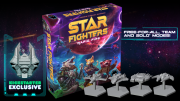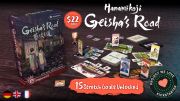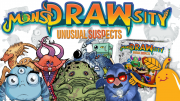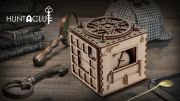Megapulse (Orion Games) – At the start of the game you choose how many laps to play and either build one of the suggested maps or build your own. Players start the game with roughly the same cards. Each turn, players each pick two cards to play and then reveal them at the same time. You then resolve the cards. Cards allow you to move around the board (if you pass over boost pads you can get extra movement), help you turn corners without taking damage, drop bombs to damage other players, shoot at opponents, and gain or use nitro to move extra spaces. On your turn you also have to choose between repairing your vehicle but slowing down or use your speed to move further up the board. As you pass through checkpoints on the map, you earn power up points, which you can then use to buy new cards for your hand, or to add upgrades to your car. Each car also has a unique ability which becomes stronger than further you fall behind in the race.
Casual Games on Kickstarter: Hovercars and Star Fighters

As we near the end of the year, there are still plenty of intriguing games on Kickstarter, from real-time dice games to cutthroat racing. There are also a couple of games for solo fans, a monstrous party game, and the sequel to Hanamikoji.
Star Fighters: Rapid Fire (Alley Cat Games) – In this real-time dice game, you are all rolling dice simultaneously as quickly as possible and assigning them to your player boards. There is a central board on which you place your ships and will be maneuvering them around. Each round, you roll your dice as quickly as possible and allocate them. The first person to complete rolling and allocating their dice yells ‘fire!’ and players who have not finished rolling must stop, and dice effects are then resolved. Dice can be used to activate weapons, raise shields, and move ships around the central board.
The Spirit of Eden (Alone Editions) – To set up this solo game, nine cards are placed in a random order at the beginning of the game, in a three-by-three grid. Goomz meeples are placed on the three cards on the left, and ally tokens are placed on the three cards on the right. On your turn, you roll four dice, and then choose which of your four action cards to place these dice on. Each action card will have different types of actions associated with different die results. You do not have to use all four dice, and you can only place one on each action card. You may discard a die to reroll another one. Actions include moving allies or goomz in various ways, protecting a card from a goomz attack, healing a card after an attack, or laying a trap for a goomz on a card. After your turn, the goomz act. They will try to attack cards on the table, an ally, or will move. If two matching cards on the table are destroyed, you lose the game. If you are able to defeat all three goomz, by completing a series of objectives for each one, you win.
Hanamikoji: Geisha's Road (TBD Games) – Five teahouse boards are set up in a circle on the table. Both players start the game with a hand of six item cards. On your turn you draw an item card and then must choose one of four actions. You can only perform each action once per round. The first action allows you to play an item card, and then add it to your tableau. This will also move the matching geisha around the circle of teahouses, moving the number of spaces equal to the number shown on the item card. For the second action, you play one item card face-down, place a token on top of it, and discard another item. The face-down item will be played at the end of the round. For the third action, you pick three item cards from your hand and play them face-up. Your opponent chooses one and adds it to her tableau and you add the other two to yours. The matching geishas are moved around the teahouses. The fourth action has you choose two sets of two item cards to play. Your opponent picks one set to play to her tableau and you play the other two. All four item cards will move geishas around the board. When a geisha lands on the teahouse that matches her color, you place a lantern card on it. Geishas can also collect guest tokens for you as they move around the board. After both players have taken all four actions, the round ends. Whoever has the most item cards in their tableau of a certain color will get to score the matching geisha's points, collecting the lantern cards on her teahouse. You also earn extra points for guest tokens. The player with the most points wins that round. Whoever wins two out of three rounds, wins the game.
MonsDRAWsity: Unusual Suspects (Deep Water Games) – This is a brand new edition of MonsDRAWsity, featuring over one hundred new monsters. Players take turns being the witness. The witness has twenty seconds to draw a suspect card and study it. He then puts the card back down. The witness then has two minutes to describe the suspect to the other players, who each attempt to draw the suspect on their player boards, following the witness's descriptions. The other players are allowed to ask clarifying questions. After the time runs out, all drawings are revealed and the witness secretly chooses which one is closest to the suspect (as far as they can remember). The suspect card is then revealed, and the other players vote for which drawing they believe was closest. The drawer who received the most votes wins one point. If the witness chose the same drawing that won the vote, he also earns one point, otherwise the artist the witness chose earns one point.
Huntaclue (Huntaclue) – Escape room game meets puzzle box, in this puzzle box designed to be solved in under an hour. Rumors are circulating that a professor has created another fantastic creation. Your investigation soon has you trapped in a locked office. Solve the puzzles to open the box and escape! This wooden puzzle box is laser-cut, and is designed to be solved by one-to-two players.
Disclosure: unless otherwise noted, we have not seen or played any of the above games. Our assessment of each is based on the information given on the crowdfunding project page.










